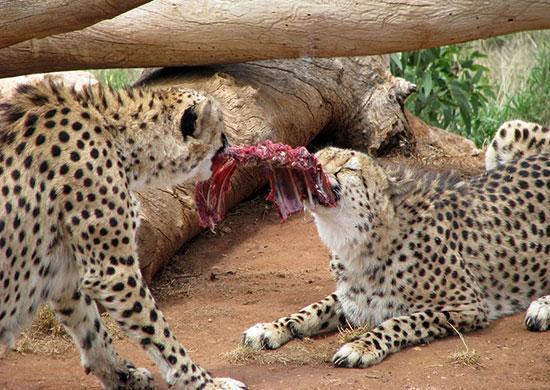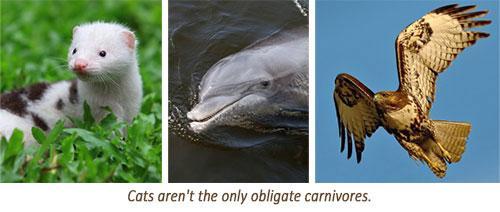This content is archived from the Feline Nutrition Foundation
Answers: What Exactly is an 'Obligate Carnivore?'
- Updated: Saturday, June 01, 2019 05:27 PM
- Published: Saturday, February 09, 2013 02:23 PM
- Written by Margaret Gates
 I have started Tedders on a raw cat food diet and I've seen a lot of improvement in his health and energy levels. When I was investigating what I should be feeding him, I kept seeing cats described as obligate carnivores. What exactly is an obligate carnivore and how is it different from a regular carnivore? Are there other obligate carnivores besides cats?
I have started Tedders on a raw cat food diet and I've seen a lot of improvement in his health and energy levels. When I was investigating what I should be feeding him, I kept seeing cats described as obligate carnivores. What exactly is an obligate carnivore and how is it different from a regular carnivore? Are there other obligate carnivores besides cats?
People refer to cats as obligate carnivores when they are trying to emphasize the fact that cats are a little different than many other meat-eating predators. Obligate means "by necessity." The dictionary definition is: 1. Restricted to one particularly characteristic mode of life. 2. Biologically essential for survival.¹ Combining obligate with carnivore is pretty clear. Cats must eat meat, it is an absolute biological necessity. There's no such thing as a vegan cat.
All felids, including domestic cats, are obligate carnivores. But, the cat is not alone in being a strict meat-eater. Other mammals that are classed as obligate carnivores include mink, tarsiers, dolphins, seals, sea lions and walruses, to name a few.² Non-mammal obligate carnivores include rainbow trout, salmon, hawks, eagles, crocodilians, many snakes and lizards and most amphibians.³
All of these animals became obligate carnivores as a result of their ancestral diets. Because eating a meat-only diet provides some vitamins and fatty acids in their pre-formed state, cats and many other obligate carnivores have lost the ability to make these amino acids and vitamins in their own bodies the way herbivores or omnivores do. They don't need to since the animals they are eating have already done it for them. For example, cats require vitamin A in its pre-formed state, but can't make it from beta-carotene the way humans or dogs or rabbits can. They have little ability to form niacin from tryptophan.⁴ They have a high requirement for taurine, which is found almost exclusively in animal flesh.⁵ Arginine, also found in animal flesh, is so critical to the cat that a meal without it can lead to death.⁶ Fortunately, all meat sources have plenty. Simply put, cats must eat meat to live.

The digestive systems of cats have also become specifically adapted to eating raw flesh. They have the shortest digestive tract compared to body size of almost any mammal.⁷ Raw prey is highly digestible and there is no need for a long gut and the fermenting bacteria that animals that eat plants need. Cats have lost some metabolic abilities simply because they don't need them anymore. You don't need to be efficient at breaking down carbohydrates when your diet contains practically none.
One of the defining characteristics of an obligate carnivore is a requirement for a high amount of protein in the diet. Cats meet their blood glucose requirements from gluconeogenesis, using protein, rather than from the breakdown of carbohydrates in their diet. They are so dependent on protein that if their diet is lacking an adequate amount to supply their energy needs, they will break down their own body muscle and organs.⁸
Additional Reading
There's No Kibble Served at the Big Cat Rescue
Answers: Are Exotic Meats Nutritious or a Novelty for Cats?
Taking a look at other animals that fall into the obligate carnivore category can be instructive. Raptors are adept predators and people naturally think of them as meat eaters. You would never imagine an eagle bringing back an ear of corn to its nest to feed its young. No one would accept the idea of trying to feed vegetables or grains to such an animal. Yet, many people would accept feeding these things to a cat. The point to be made is that many animals that people automatically think of and accept as exclusively raw meat eaters are in the same category as their companion cats. Yet, they think of cats as somehow excused from the raw food only club.
You have started feeding the raw cat food diet your cat has evolved to eat, and you've seen the great results of bio-appropriate cat nutriton. Welcome back to the club, Tedders!
Note: Feline Nutrition provides feline health and nutrition information as a public service. Diagnosis and treatment of specific conditions should always be in consultation with your own veterinarian. Feline Nutrition disclaims all warranties and liability related to the veterinary advice and information provided on this site.
Margaret Gates is the founder of the Feline Nutrition Foundation.
1. Merriam Webster Online Dictionary
2. Duane E Ullrey, "Nutrient Requirements: Carnivores," Encyclopedia of Animal Science by Wilson G Pond and Alan W Bell, CRC Press, 2005, 670.
3. Ullrey, 672.
4. Ullrey, 670.
5. Ullrey, 591.
6. James G Morris, "Nutritional and Metabolic Responses to Arginine Deficiency in Carnivores," Journal of Nutrition 115, 1985, 524-531.
7. Ann Wortinger, BIS, LVT, VTS, "Cats: Obligate Carnivore," CVC in Kansas City Proceedings, Aug 1, 2010.
8. Wortinger, "Cats: Obligate Carnivore."




